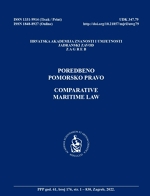Problemi pravne (ne)reguliranosti (mikro)plastike u morskom i riječnom okolišu
Problems of the Legal (Non)Regulation of (Micro)Plastics in the Marine and River Environment
Author(s): Biljana Činčurak ErcegSubject(s): Law, Constitution, Jurisprudence, Energy and Environmental Studies, Maritime Law
Published by: Hrvatska akademija znanosti i umjetnosti
Keywords: plastics; microplastics; waste; legal regulation; marine environment pollution; river environment pollution; international; European and Croatian sources of law on the prevention of pollution;
Summary/Abstract: The durability of plastics, plastic litter’s ability to “travel” on rivers and across long distances as well as to accumulate in the seas and remain in the environment for a long period pose a great danger, the solution to which raises a challenge at the global level. Microplastic is a part or piece of plastic smaller than 5 mm, although this name is also used for all “small” pieces of plastic. In recent years, there has been growing awareness that plastic waste needs to be urgently reduced, especially in the marine environment. The primary source of marine pollution is rivers, i.e., land-based sources. Large amounts of plastic flow into rivers, and their final destination is the seas. This paper presents data on the categorisation and types of plastics, quantities of plastics in the marine environment, and the problems that arise there. Pollution of the marine environment, marine litter, and pollution of the riverine environment are also discussed. Soft law dominates global efforts to address marine litter problems. There is currently no international treaty regulating plastic pollution, although some regulations include, among other things, provisions on the prevention of marine pollution. The paper aims to present the key provisions of relevant international sources of law governing pollution of the marine environment and the river environment. Whether they contain provisions related to (micro)plastics and plastic waste and whether they provide a sufficient legal framework to prevent plastic and river pollution are duly examined. The most important European directives and the laws of the Republic of Croatia relating to marine pollution, water pollution, and waste are presented in particular. Finally, proposals are made for solving the problem of plastic in the environment and for better legal regulation of this issue.
Journal: Poredbeno pomorsko pravo
- Issue Year: 61/2022
- Issue No: 176
- Page Range: 135-175
- Page Count: 41
- Language: Croatian

